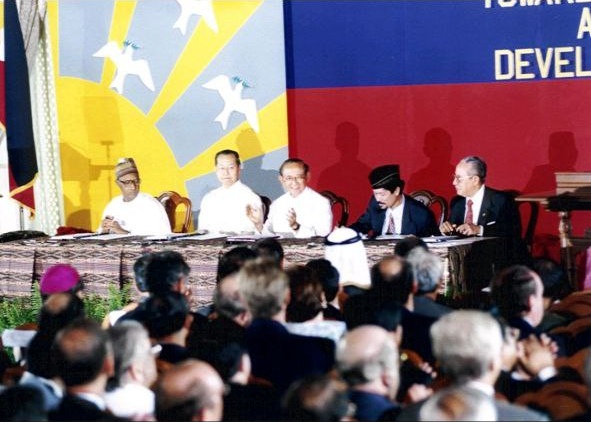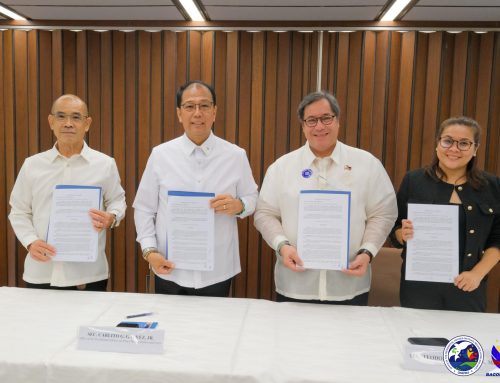OPAPRU pushes for creation of National Amnesty Commission
PASIG CITY (August 4, 2022) – Presidential Adviser for Peace, Reconciliation and Unity (OPAPRU) Sec. Carlito G. Galvez, Jr. said he will not forget Proclamation No. 723 that was issued by former President Fidel V. Ramos 26 years ago.
Galvez was among the beneficiaries of the said proclamation in 1996 which granted amnesty to military officers who participated in the 1989 coup attempt “for the attainment of a just, comprehensive and lasting peace under the rule of law and in accordance with constitutional processes.”
“I will forever be grateful to FVR because he gave me and my fellow officers a second chance in life. It was through that amnesty proclamation that I was able to revive my military service and go on to become the Armed Forces of the Philippines’ chief-of- staff,” he said.
Giving flesh to EO 125
This is the reason, Galvez said, why the OPAPRU has been pushing for the formal establishment of the National Amnesty Commission (NAC), which was created by virtue of Executive Order No. 125 issued by former President Rodrigo Roa Duterte in February 2021.
Relative to EO 125, Duterte also released Presidential Proclamation Nos. 1090, 1091, 1092, and 1093 which grants amnesty to members of the Moro Islamic Liberation Front (MILF), Moro National Liberation Front (MNLF), Rebolusyonaryong Partidong Manggagawa ng Pilipinas/Revolutionary Proletarian Army/Alex Boncayao Brigade- Tabara Paduano Group (RPM-P/RPA/ABB-TPG) or KAPATIRAN, and the Communist Party of the Philippines – New People’s Army – National Democratic Front (CPP-NPA- NDF), respectively, who committed crimes during the course of their armed struggle.
The House of Representatives’ Committees on Justice, and National Defense and Security passed in March 2021 House Resolutions No. 12, 13, 14 and 15 which concurred with Presidential Proclamations No. 1090 to 1093.
The Senate, for its part, adopted House Resolutions No. 12, 13, 14 but withheld its concurrence to Proclamation 1093, which grants amnesty to the members of the CPP- NPA-NDF.
The seven-member NAC will be composed of a chairperson, two regular members, and four ex-officio members.
The secretaries of National Defense, Justice, and the Interior and Local Government, as well as the peace adviser shall serve as ex-officio members of the body.
“With the creation of the NAC, we hope to provide former rebels with an opportunity to fully reintegrate themselves into mainstream society as peaceful, productive and law- abiding individuals,” Galvez said.
“More importantly, the national government would like to send a clear and strong message that through the granting of amnesty, it is determined to address the roots of the armed conflict in the country and provide a better life for the former combatants,” he added.
Remembering FVR
According to the peace adviser, the passing of FVR had struck a sensitive chord in him not only because of the impact the former president had on his professional career, but more importantly, on the comprehensive Philippine process.
“What made former President Ramos remarkable as a leader was his invaluable contribution to the comprehensive Philippine peace process. Even though he was a military man, peace was an integral part of his DNA,” Galvez said.
The former president, he said, will always be remembered for jumpstarting the peace processes with the various rebel groups in the country because he believed that genuine peace could only be achieved through open and honest dialogue.
“FVR was a statesman who had a very good appreciation of the peace process. He knew that peace and development initiatives had to be implemented simultaneously. This mindset would become the hallmark of his administration,” Galvez said.
He recalled that it was under the former president’s term when the government launched a nationwide consultation process which aimed to develop a strategy to engage various rebel groups in the country.
Galvez said these consultations led to the creation of the National Unification Commission (NUC). The body was tasked to craft a viable general amnesty program and process that will bring a just, comprehensive and lasting peace to all Filipinos.
He said the NUC-led consultations were groundbreaking, as the inputs gathered during the forums were used in crafting the Six Paths to Peace which would eventually become the framework of the Philippine peace process.
“The Six Paths to Peace have been embedded in the peace policy agenda of succeeding administrations and would serve as the foundation of the national government’s peacebuilding efforts,” Galvez said.
The Office of the Presidential Adviser on the Peace Process (OPAPP), which would later be renamed as the OPAPRU, was created in 1993 to carry out the recommendations submitted by the NUC to the national government.
Galvez said a major turning point in the Philippine peace process during the term of FVR was the establishment of the government peace negotiating panels with the communist insurgents, military rebels and Moro groups.
Among the key peace milestones under the Ramos administration was the signing of the Final Peace Agreement between the Government of the Philippine and the Moro National Liberation Front (MNLF) in 1996, which finally put an end to decades of armed conflict.
Galvez noted that the creation of the peace panels was a major win for the country’s peace process. It enabled the national government and various rebel groups to sit down across each other to discuss and resolve key issues, and eventually find a peaceful settlement.
“Under the Marcos administration’s banner of national unity, we seek inspiration from the legacy of peace that has been left behind by FVR. We will honor his memory by continuing what he had started,” he said. ###
[FEATURED: File Photo of the late Former President Fidel V. Ramos during the signing of the 1996 Final Peace Agreement between the GRP and the MNLF]












